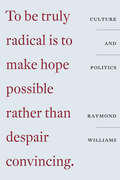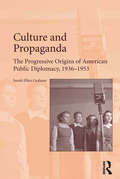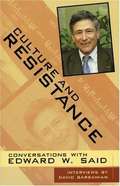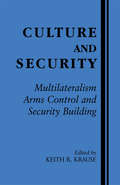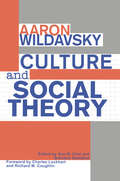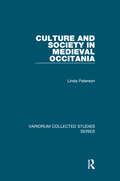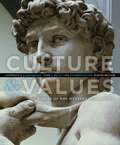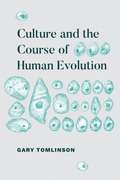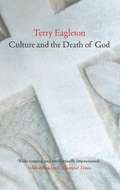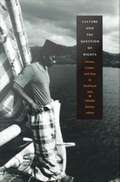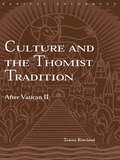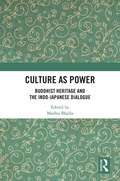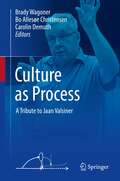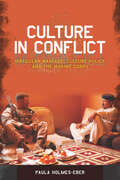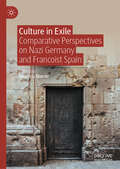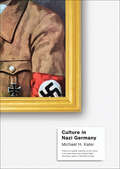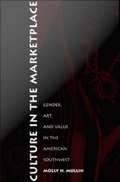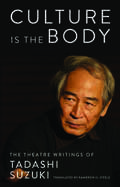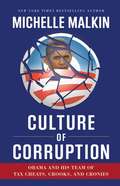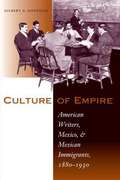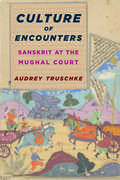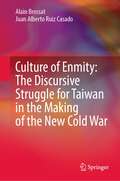- Table View
- List View
Culture and Morality: The Relativity of Values in Anthropology
by Elvin HatchContents<P><P> 1. The Facets of Relativism <P> 2. The Historical Context <P> 3. The New Self-Identity <P> 4. The Call for Tolerance <P> 5. The Limits of Tolerance <P> 6. A Growing Disaffection <P> 7. A Working Alternative
Culture and Politics: Class, Writing, Socialism
by Raymond WilliamsBrand new collection of the essential essays from one of the founders of cultural studies, Raymond WilliamsRaymond Williams was a pioneering scholar of cultural and society, and one of the outstanding intellectuals of the twentieth century. In this, a collection of difficult to find essays, some of which are published for the first time, Williams emerges as not only one of the great writers of materialist criticism, but also a thoroughly engaged political writer.Published to coincide with the centenary of his birth and showing the full range of his work, from his early writings on the novel and society, to later work on ecosocialism and the politics of modernism, Politics and Culture shows Williams at both his most accessible and his most penetrating.An essential book for all those interested in the politics of culture in the twentieth century, and the development of Williams's work.
Culture and Propaganda: The Progressive Origins of American Public Diplomacy, 1936-1953
by Sarah Ellen GrahamThroughout the twentieth century governments came to increasingly appreciate the value of soft power to help them achieve their foreign policy ambitions. Covering the crucial period between 1936 and 1953, this book examines the U.S. government’s adoption of diplomatic programs that were designed to persuade, inform, and attract global public opinion in support of American national interests. Cultural diplomacy and international information were deeply controversial to an American public that been bombarded with propaganda during the First World War. This book explains how new notions of propaganda as reciprocal exchange, cultural engagement, and enlightening information paved the way for innovations in U.S. diplomatic practice. Through a comparative analysis of the State Department’s Division of Cultural Relations, the government radio station Voice of America, and the multilateral cultural, educational and scientific diplomacy of Unesco, and drawing extensively on U.S. foreign policy archives, this book shows how America’s liberal traditions were reconciled with the task of influencing and attracting publics abroad.
Culture and Resistance: Conversations with Edward W. Said
by Edward W. Said David BarsamianEdward W. Said discusses the centrality of popular resistance to his understanding of culture, history, and social change. He reveals his latest thoughts on the war on terrorism, the war in Afghanistan, and the Israeli-Palestinian conflict.
Culture and Security: Multilateralism, Arms Control and Security Building
by Keith R. KrauseA comprehensive and empirically rich set of case studies that examine the impact of socio-cultural influences on multilateral arms control and security-building processes around the world.
Culture and Social Theory
by Aaron WildavskyAaron Wildavsky, along with Mary Douglas, identified what they called grid-group theory. Wildavsky began calling this "cultural theory," and applied it to an astounding array of subjects. The essays in this volume exemplify the theory's potential contributions to three seemingly disparate, but related, areas: the social construction of meaning, normative/analytic political philosophy, and a theory of rational choices. This book is the first in a series of Aaron Wildavsky's collected writings being published posthumously by Transaction. Wildavsky selected, sequenced, and grouped all but three of the essays included in Culture and Social Theory prior to his death. Some are presented here for the first time. Wildavsky's cultural theory provides ways to organize and interpret the world.In the first section, he shows how social scientists, particularly economists and sociologists, apply the theory. Wildavsky argues that concepts such as externalities, public goods, altruism, and even risk and rape are tools of rival, ubiquitous cultures engaged in perpetual struggle with one another. The second section deals with cultural theory as a way to interpret the works of normative and analytic political philosophers, including Thomas Hobbes and John Stuart Mill, on competing human objectives. Wildavsky argues that particular types of interaction among a society's cultures are necessary for effective realization of basic concepts such as democracy. In the third section, Wildavsky applies cultural theory in conjunction with instrumental rationality, the former as a theory of preference formation, the latter as a device for realizing preferences efficiently. High-priority objectives, and thus the character of norms and rational action, shift across cultures. The world and its various elements comprise a complex, frequently changing, and thus ambiguous reality, nowhere more so than in the dynamic contours of the United States. For cultural theory, individualistic, hierarchical, and egalitarian interpretations of the world are the only ones capable of forming and sustaining institutions and related patterns of social relations that will support human social groups.Wildavsky's central objective is to strip away the camouflage and to reveal varying domains of social life as fields of cultural competition. Culture and Social Theory will be a necessary addition to the libraries of political scientists, economists, and policymakers, not to mention all those who admire Aaron Wildavsky and his work.
Culture and Society in Medieval Occitania (Variorum Collected Studies #970)
by Linda PatersonMedieval Occitania, a geographical and linguistic area often referred to as 'the South of France', 'the South', 'the Midi', or more loosely 'Provence', was politically diverse but culturally coherent. It was here that the troubadours created Courtly Love and a new poetic language, which together were to affect the whole course of European literature and sensibilities. The essays made readily accessible in this collection reflect the author's many-sided interests in the troubadours and the society from which they sprang: the historical and cultural place of the women forming the ostensible objects of their desire, veneration, or anxieties; the extent to which French notions of chivalry penetrated the South; the nature and meaning of various elements of court culture; the precocious development of medical science in this region; its complex responses to the Crusades; and the question of Occitan identity. Mostly complementing her major publications (The World of the Troubadours, collaborative editions of the songs of the troubadour Marcabru, of the epic fragment the Canso d'Antioca, and of the medieval Occitan tensos and partimens), they provide either more detailed material than found its way into those works, or developments from them. 'Occitan literature and the Holy Land' anticipates a new project on responses to the Crusades in Occitan and Old French lyrics.
Culture and Values: A Survey of the Humanities (8th Edition)
by Lois Fichner-Rathus Lawrence S. Cunningham John J. ReichCULTURE AND VALUES: A SURVEY OF THE WESTERN HUMANITIES takes you on a fascinating tour of some of the world's most significant examples of art, music, philosophy, and literature, from the beginnings of civilization to today. New features in the eighth edition are designed to make it easy for you to understand the influence of historical events and values on the works produced by each culture--guided discussions of all of the readings, chapter previews, timelines, "Compare and Contrast" sections, "Big Picture" reviews at the end of each chapter, and high-quality images with clear captions.
Culture and the Course of Human Evolution
by Gary TomlinsonThe rapid evolutionary development of modern Homo sapiens over the past 200,000 years is a topic of fevered interest in numerous disciplines. How did humans, while undergoing few physical changes from their first arrival, so quickly develop the capacities to transform their world? Gary Tomlinson’s Culture and the Course of Human Evolution is aimed at both scientists and humanists, and it makes the case that neither side alone can answer the most important questions about our origins. Tomlinson offers a new model for understanding this period in our emergence, one based on analysis of advancing human cultures in an evolution that was simultaneously cultural and biological—a biocultural evolution. He places front and center the emergence of culture and the human capacities to create it, in a fashion that expands the conceptual framework of recent evolutionary theory. His wide-ranging vision encompasses arguments on the development of music, modern technology, and metaphysics. At the heart of these developments, he shows, are transformations in our species’ particular knack for signmaking. With its innovative synthesis of humanistic and scientific ideas, this book will be an essential text.
Culture and the Death of God
by Terry EagletonHow to live in a supposedly faithless world threatened by religious fundamentalism? Terry Eagleton, formidable thinker and renowned cultural critic, investigates in this thought-provoking book the contradictions, difficulties, and significance of the modern search for a replacement for God. Engaging with a phenomenally wide range of ideas, issues, and thinkers from the Enlightenment to today, Eagleton discusses the state of religion before and after 9/11, the ironies surrounding Western capitalism's part in spawning not only secularism but also fundamentalism, and the unsatisfactory surrogates for the Almighty invented in the post-Enlightenment era. The author reflects on the unique capacities of religion, the possibilities of culture and art as modern paths to salvation, the so-called war on terror's impact on atheism, and a host of other topics of concern to those who envision a future in which just and compassionate communities thrive. Lucid, stylish, and entertaining in his usual manner, Eagleton presents a brilliant survey of modern thought that also serves as a timely, urgently needed intervention into our perilous political present.
Culture and the Question of Rights: Forests, Coasts, and Seas in Southeast Asia
by Charles ZernerThis collection of ethnographic and interpretive essays fundamentally alters the debate over indigenous land claims in Southeast Asia and beyond. Based on fieldwork conducted in Malaysia and Indonesia during the 1980s and 1990s, these studies explore new terrain at the intersection of environmental justice, nature conservation, cultural performance, and the politics of making and interpreting claims. Calling for radical redefinitions of development and ownership and for new understandings of the translation of culture and rights in politically dangerous contexts--natural resource frontiers--this volume links social injustice and the degradation of Southeast Asian environments. Charles Zerner and his colleagues show how geographical areas once viewed as wild and undeveloped are actually cultural artifacts shaped by complex interactions with human societies. Drawing on richly varied sources of evidence and interpretation--from trance dances, court proceedings, tree planting patterns, marine and forest rituals, erotic poems, and codifications of customary law, Culture and the Question of Rights reveals the ironies, complexities, and histories of contemporary communities' struggles to retain their gardens, forests, fishing territories, and graveyards. The contributors examine how these cultural activities work to both construct and to lay claim to nature. These essays open up new avenues for negotiating indigenous rights against a background of violence, proliferating markets, and global ideas of biodiversity and threatened habitat. Contributors. Jane Atkinson, Don Brenneis, Stephanie Fried, Nancy Peluso, Marina Roseman, Anna Tsing, Charles Zerner
Culture and the Thomist Tradition: After Vatican II (Routledge Radical Orthodoxy)
by Tracey RowlandThomism's influence upon the development of Catholicism is difficult to overestimate - but how secure is its grip on the challenges that face contemporary society? Culture and the Thomist Tradition examines the crisis of Thomism today as thrown into relief by Vatican II, the twenty-first ecumenical council of the Roman Catholic Church. Following the Church's declarations on culture in the document Gaudium et spes - the Pastoral Constitution on the Church in the Modern World - it was widely presumed that a mandate had been given for transposing ecclesiastical culture into the idioms of modernity. But, says Tracey Rowland, such an understanding is not only based on a facile reading of the Conciliar documents, but was made possible by Thomism's own failure to demonstrate a workable theology of culture that might guide the Church through such transpositions.A Thomism that fails to specify the precise rôle of culture in moral fomration is problematice in a multicultural age, where Christians are exposed to a complex matrix of institutions and traditions both theistic and secular. The ambivalence of the Thomist tradition to modernity, and modern conceptions of rationality, also impedes its ability to successfully engage with the arguments of rivial traditions. Must a genuinely progressive Thomism learn to accomodate modernity? In opposition to such a stance, and in support of those who have resisted the trend in post-Conciliarliturgy to mimic the modernistic forms of mass culture, Culture and the Thomist Tradition musters a synthesis of the theological critiques of modernity to be found in the works of Alasdair MacIntyre, scholars of the international 'Communio' project and the Radical Orthodoxy circle. This synthesis, intended as a post-modern Augustinian Thomism, provides an account of the rôle of culture, memory and narrative tradition in the formation of intellectual and moral character. Re-evaluating the outcome of Vatican II, and forming the basis of a much-needed Thomist theology of culture, the book argues that the anti-beauty orientation of mass culture acts as a barrier to the theological virtue of hope, and ultimately fosters despair and atheism.
Culture as Power: Buddhist Heritage and the Indo-Japanese Dialogue
by Madhu BhallaThis book presents new studies on intellectual and cultural interactions in the context of Buddhist heritage and Indo-Japanese dialogue in the late 19th and early 20th centuries on art, religion, and cultural politics. By revisiting Buddhist connections between India and Japan, it examines the pathways of communication on common aesthetic and religious heritage that emerged in the backdrop of colonial experiences and the rise of Asian nationalisms. The volume discusses themes such as Asian arts and crafts under colonialism, formation of East Asian art collections, development of Buddhist art history in Japan, Japanese encounters with Ajanta, India in the history of the Shinto tradition, Japan in India’s xenology, and Buddhism and world peace, and suggests paradigms of reconnecting cultural heritage within a global platform. With essays from experts across the world, this book will be an essential read for scholars and researchers of history, art history, ancient Indian history, colonial history, heritage and cultural studies, South Asian and East Asian history, visual and media studies, Asian studies, international relations and foreign policy, and the history of globalization.
Culture as Process: A Tribute to Jaan Valsiner
by Brady Wagoner Bo Allesøe Christensen Carolin DemuthJaan Valsiner has made numerous contributions to the development of psychology over the last 40 years. He is internationally recognized as a leader and innovator within both developmental psychology and cultural psychology, and has received numerous prizes for his work: the Alexander von Humboldt prize, the Hans Killian prize, and the Outstanding International Psychologist Award from the American Psychological Association. Having taught at Universities in Europe, Asia and north and south America, he is currently Niels Bohr professor at Aalborg University, Denmark. This book is the first to discuss in detail the different sides of Valsiner’s thought, including developmental science, semiotic mediation, cultural transmission, aesthetics, globalization of science, epistemology, methodology and the history of ideas. The book provides an overview, evaluation and extension of Valsiner’s key ideas for the construction of a dynamic cultural psychology, written by his former students and colleagues from around the world.
Culture in Conflict: Irregular Warfare, Culture Policy, and the Marine Corps
by Paula Holmes-EberIn response to the irregular warfare challenges facing the U. S. in Iraq and Afghanistan in 2005, General James Mattis#151;then commander of Marine Corps Combat Development Command#151;established a new Marine Corps cultural initiative. The goal was simple: teach Marines to interact successfully with the local population in areas of conflict. The implications, however, were anything but simple: transform an elite military culture founded on the principles of "locate, close with, and destroy the enemy" into a "culturally savvy" Marine Corps. Culture in Conflict: Irregular Warfare, Culture Policy, and the Marine Corps examines the conflicted trajectory of the Marine Corps' efforts to institute a radical culture policy into a military organization that is structured and trained to fight conventional wars. More importantly, however, it is a compelling book about America's shifting military identity in a new world of unconventional warfare.
Culture in Conflict: Irregular Warfare, Culture Policy, and the Marine Corps
by Paula Holmes-EberIn response to the irregular warfare challenges facing the U. S. in Iraq and Afghanistan in 2005, General James Mattis#151;then commander of Marine Corps Combat Development Command#151;established a new Marine Corps cultural initiative. The goal was simple: teach Marines to interact successfully with the local population in areas of conflict. The implications, however, were anything but simple: transform an elite military culture founded on the principles of "locate, close with, and destroy the enemy" into a "culturally savvy" Marine Corps. Culture in Conflict: Irregular Warfare, Culture Policy, and the Marine Corps examines the conflicted trajectory of the Marine Corps' efforts to institute a radical culture policy into a military organization that is structured and trained to fight conventional wars. More importantly, however, it is a compelling book about America's shifting military identity in a new world of unconventional warfare.
Culture in Exile: Comparative Perspectives on Nazi Germany and Francoist Spain
by Elisenda MarcerThis edited book breaks new ground by bringing together research on inner and territorial exile in the context of National Socialism in Germany and the Franco regime in Spain, and in proposing an integrated model of exilic cultural production. Original contributions explore previously neglected aspects of the inner and territorial exile cultures, focusing on the specificity of the national settings (including Catalonia) whilst also seeking to place research findings within a conceptual framework of exile which views the experiences and cultural manifestations of inner and territorial exiles not as polar opposites, but as interactions of response to fascist dictatorship. This book will be of interest to scholars and students of German Studies, Hispanic Studies, comparative literary and cultural studies, and modern history more broadly.
Culture in Nazi Germany: Jazz In The Culture Of Nazi Germany
by Michael H. Kater&“A much-needed study of the aesthetics and cultural mores of the Third Reich . . . rich in detail and documentation.&” (Kirkus Reviews) Culture was integral to the smooth running of the Third Reich. In the years preceding WWII, a wide variety of artistic forms were used to instill a Nazi ideology in the German people and to manipulate the public perception of Hitler&’s enemies. During the war, the arts were closely tied to the propaganda machine that promoted the cause of Germany&’s military campaigns. Michael H. Kater&’s engaging and deeply researched account of artistic culture within Nazi Germany considers how the German arts-and-letters scene was transformed when the Nazis came to power. With a broad purview that ranges widely across music, literature, film, theater, the press, and visual arts, Kater details the struggle between creative autonomy and political control as he looks at what became of German artists and their work both during and subsequent to Nazi rule. &“Absorbing, chilling study of German artistic life under Hitler&” —The Sunday Times &“There is no greater authority on the culture of the Nazi period than Michael Kater, and his latest, most ambitious work gives a comprehensive overview of a dismally complex history, astonishing in its breadth of knowledge and acute in its critical perceptions.&” —Alex Ross, music critic at The New Yorker and author of The Rest is Noise Listed on Choice's Outstanding Academic Titles List for 2019 Winner of the Jewish Literary Award in Scholarship
Culture in the Marketplace: Gender, Art, and Value in the American Southwest
by Molly MullinIn the early twentieth century, a group of elite East coast women turned to the American Southwest in search of an alternative to European-derived concepts of culture. In Culture in the Marketplace Molly H. Mullin provides a detailed narrative of the growing influence that this network of women had on the Native American art market--as well as the influence these activities had on them--in order to investigate the social construction of value and the history of American concepts of culture. Drawing on fiction, memoirs, journalistic accounts, and extensive interviews with artists, collectors, and dealers, Mullin shows how anthropological notions of culture were used to valorize Indian art and create a Southwest Indian art market. By turning their attention to Indian affairs and art in Santa Fe, New Mexico, she argues, these women escaped the gender restrictions of their eastern communities and found ways of bridging public and private spheres of influence. Tourism, in turn, became a means of furthering this cultural colonization. Mullin traces the development of aesthetic worth as it was influenced not only by politics and profit but also by gender, class, and regional identities, revealing how notions of "culture" and "authenticity" are fundamentally social ones. She also shows how many of the institutions that the early patrons helped to establish continue to play an important role in the contemporary market for American Indian art. This book will appeal to audiences in cultural anthropology, art history, American studies, women's studies, and cultural history.
Culture is the Body
by Tadashi Suzuki Kameron Steele"Mr. Suzuki's art seeks to reach audiences not through the intellect but through the senses and instincts."--New York Times"In my opinion, a 'cultured' society is one where the perceptive and expressive abilities of the human body are used to the full; where they provide the basic means of communication."--Tadashi SuzukiRenowned for his actor training methods, Tadashi Suzuki provides a thorough and accessible formulation of his ideas and beliefs in this new edition of his theater writings. One of the world's most revered theater directors, Suzuki is also a seminal thinker and practitioner whose work has had a profound influence on theater worldwide. This landmark collection provides a useful, provocative look at his philosophical and practical approaches to the stage. Culture is the Body is a complete revision of Suzuki's influential book The Way of Acting, featuring new essays and in a revised translation by Kameron Steele, a longtime collaborator of Suzuki's.Legendary theater director Tadashi Suzuki explains his revered approach in this new edition of his writings.Tadashi Suzuki is the founder and director of the Suzuki Company of Toga (SCOT), the organizer of Japan's first international theater festival (Toga Festival), and the creator of the Suzuki Method of Actor Training. Suzuki has articulated his theories in a number of books. He has taught his system of actor training in schools and theaters throughout the world. Besides productions with his own company, he has directed several international collaborations.
Culture of Corruption: Obama and His Team of Tax Cheats, Crooks, and Cronies
by Michelle MalkinIn her shocking new book, Malkin goes where the mainstream media refuse to tread. She digs deep into the records of President Obama's staff, revealing corrupt dealings, questionable pasts, and abuses of power throughout his administration.
Culture of Empire: American Writers, Mexico, and Mexican Immigrants, 1880-1930
by González Gilbert G.In this stimulating history, Gilbert G. González traces the development of the culture of empire and its effects on U.S. attitudes and policies toward Mexican immigrants. Following a discussion of the United States' economic conquest of the Mexican economy, González examines several hundred pieces of writing by American missionaries, diplomats, business people, journalists, academics, travelers, and others who together created the stereotype of the Mexican peon and the perception of a "Mexican problem." He then fully and insightfully discusses how this misinformation has shaped decades of U.S. public policy toward Mexican immigrants and the Chicano (now Latino) community, especially in terms of the way university training of school superintendents, teachers, and counselors drew on this literature in forming the educational practices that have long been applied to the Mexican immigrant community.
Culture of Encounters
by Audrey TruschkeThis rich history documents the fascinating, overlooked exchange between the Persian-speaking Islamic elite of the early Mughal Empire and traditional Sanskrit scholars. The book begins with the invitation of Brahman and Jain intellectuals to King Akbar's court in the 1560s, then details the numerous, Mughal-backed texts they and their Mughal interlocutors produced under emperors Akbar, Jahangir (1605-1627), and Shah Jahan (1628-1658).These cross-cultural encounters engendered a dynamic idea of Mughal rule essential to the empire's survival. Many works, including Sanskrit epics and historical texts, were translated into Persian, elevating the political position of Brahmans and Jains and cultivating a voracious appetite for Indian writings throughout the Mughal world. The first book to read these Sanskrit and Persian works in tandem, Culture of Encounters recasts the Mughal Empire as a polyglot polity that collaborated with its Indian subjects to envision its sovereignty. This study also reframes the development of Brahman and Jain communities under Mughal rule, which coalesced around carefully selected, politically salient memories of imperial interaction. Culture of Encounters certifies the critical role of the sociology of empire in building the Mughal polity, which came to irrevocably shape the literary and ruling cultures of early modern India.
Culture of Encounters: Sanskrit at the Mughal Court (South Asia Across the Disciplines)
by Audrey TruschkeCulture of Encounters documents the fascinating exchange between the Persian-speaking Islamic elite of the Mughal Empire and traditional Sanskrit scholars, which engendered a dynamic idea of Mughal rule essential to the empire's survival. This history begins with the invitation of Brahman and Jain intellectuals to King Akbar's court in the 1560s, then details the numerous Mughal-backed texts they and their Mughal interlocutors produced under emperors Akbar, Jahangir (1605–1627), and Shah Jahan (1628–1658). Many works, including Sanskrit epics and historical texts, were translated into Persian, elevating the political position of Brahmans and Jains and cultivating a voracious appetite for Indian writings throughout the Mughal world. The first book to read these Sanskrit and Persian works in tandem, Culture of Encounters recasts the Mughal Empire as a polyglot polity that collaborated with its Indian subjects to envision its sovereignty. The work also reframes the development of Brahman and Jain communities under Mughal rule, which coalesced around carefully selected, politically salient memories of imperial interaction. Along with its groundbreaking findings, Culture of Encounters certifies the critical role of the sociology of empire in building the Mughal polity, which came to irrevocably shape the literary and ruling cultures of early modern India.
Culture of Enmity: The Discursive Struggle for Taiwan in the Making of the New Cold War
by Alain Brossat Juan Alberto Ruiz CasadoThis book provides a thought-provoking analysis of the perception of China as a formidable threat amidst the current era of socio-political polarization and growing militarization. By exploring the discursive strategies and tactics employed to cultivate antagonism, it unveils the “culture of enmity” that fosters fear and distrust towards China, both in Taiwan and beyond. Drawing on interdisciplinary research, the book delves into the ontological characteristics of such a culture and provides insights into the Taiwan conflict as a crucial observation post for understanding the intricate discursive dynamics of the New Cold War. The geopolitical situation of Taiwan presents a predicament as it finds itself at the crossroads of two conflicting realms. On one hand, it is deeply intertwined with Chinese culture and history, with the added dimension of its strategic proximity to China at a time when the latter aspires to become a regional hegemon. On the other hand, Taiwan boasts a Western-influenced political system, Western-leaning strategic alliances, and a distinct political identity forged over the past few decades. It is within this intricate interplay of apparently dissonant but overlapping factors that the thorny and challenging nature of the discursive struggle for Taiwan becomes apparent. The book consists of a collection of articles initially created by the authors during their research in Taiwan over several years, first at National Yang Ming Chiao Tung University and then at National Cheng Kung University. The articles, organized into different chapters, cover various disciplines such as political philosophy, geopolitics, history, discourse analysis, and anthropology, reflecting the diverse educational backgrounds of the authors. Despite their diversity, all chapters are deeply connected to the discursive struggle over Taiwan. Ultimately, by offering a nuanced perspective that challenges prevailing narratives, the authors provide a deliberately controversial yet refreshing viewpoint that advocates for a policy of empathy and negotiation. Such approach goes beyond mere dialogue and diplomacy, emphasizing the need for coexistence and peaceful living among different “worlds”.

